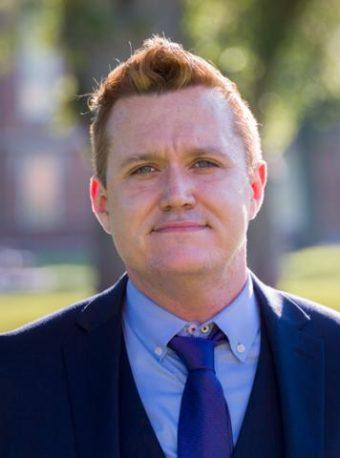Christopher Conner, assistant professor of sociology in the College of Arts & Science (A&S), has been selected for the Kathy Charmaz Early-In Career Award from the Study of Symbolic Interaction (SSSI). Conner has devoted his career to exploring how culture impacts society. The award acknowledges Conner's significant research contributions to the field of symbolic interaction and potential.
Kathy Charmaz, professor emerita of sociology at Sonoma State University, was the developer of Constructivist Grounded Theory, the major research method in qualitative research. What does winning the Kathy Charmaz Early-In Career Award mean to you?
This award is the epitome of what people say when they cry ‘I’ve come full circle.’ I had the pleasure of knowing Kathy Charmaz. She was the first academic I met at a conference. She asked me to sit next to her at the award banquet, at the time I was an awkward looking undergraduate. Later in my career she would come up to me and my dissertation advisor and compliment us on a paper we presented nearly two decades later. Kathy was a widely recognized scholar within and outside the discipline. This award recognizes my contributions to the field, but also in the spirit of Dr. Charmaz acknowledges those who I have helped along the way—including many graduate students here at the University of Missouri.
The award honors individuals who have made significant contributions to the field of symbolic interaction and potential within the first ten years since completing their Ph.D. How did your work in the music industry more than a decade ago inspire your research?
My research seeks to bring a better understanding to something that profoundly impacted me and those close to me. While working in the music industry in my 20s, the disparity between those in the communities who made it and those who wanted to make it was heartbreaking. I went to graduate school to understand why, and that is when I encountered the work of Theodor W. Adorno and the culture industry. From that minute on I began dedicating the rest of my career to understanding how culture impacts society.
Your current research focuses on QAnon. How is your work leading to a better understanding of this American political theory and movement?
The study of misinformation, disinformation, and how we come to accept alternative narratives as truth cuts to a fundamental question within the philosophy of science and one that is impacting our current electorate. QAnon represents the criticisms of the culture industry and social media. Some of my other work speaks to this, especially my work on the gay dating app Grindr where I seek to understand the expressions of inequality—racism, hypermasculinity, ageism, HIV stigma, and others that users engage in on the app. The uniting thread of my work is in how changes in technology and larger culture forces shape how we interact with each other and as a society.
What impact has this award had on your career?
I am now a tenure track assistant professor of sociology at Mizzou, thanks in some degree to this award. I look forward to continuing my work as a researcher and mentor to our undergraduate students. My work will continue to provide insight into the science of sociology and provide recognition for the work of not only me, but also my department, A&S, and Mizzou.
Conner’s experience in the music industry inspired his recently published book, “Electronic Dance Music: From Deviant Subculture to Culture Industry.
SSSI is an international professional organization of scholars interested in the study of a range of social issues with an emphasis on identity, everyday practice, and language.
